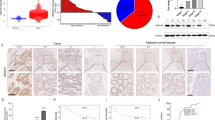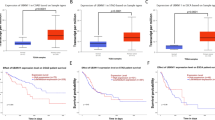Abstract
Purpose
UbcH10 is the cancer-related E2 ubiquitin-conjugating enzyme, and its overexpression has been demonstrated in a variety of malignancies. The aim of this study is to investigate the association of UbcH10 gene expression with the carcinogenesis and tumor progression of colorectal cancer.
Methods
The expression levels of UbcH10 in human malignant colorectal carcinoma tissues and their adjacent normal tissues were examined using real-time quantitative RT-PCR and immunohistochemical analysis. The correlations of UbcH10 expression to the clinicalpathologic characteristics of the colorectal cancer were analyzed. Cell proliferation and Matrigel invasion assays were performed in HT-29 cells transfected with UbcH10 expression plasmid pcDNA3.1-UbcH10, UbcH10 RNA interference vector pUbcH10-RNAi as well as their control vectors.
Results
Our study demonstrated that the expression of UbcH10 in colorectal carcinoma tissues was significantly higher than that in non-cancerous tissues (P < 0.01), and the UbcH10 overexpression was related to the degree of tumor differentiation and lymph node metastasis of colorectal cancer patients (P < 0.05). In vitro, the overexpression of UbcH10 promoted cell proliferation and tumor invasiveness, but the downregulation of UbcH10 expression significantly reduced the growth rate and the invasiveness activity of tumor cell line.
Conclusions
Our study suggests that the overexpression of UbcH10 gene plays a critical role in the carcinogenesis and tumor progression of colorectal cancer. It may be a new marker in diagnosis and prognosis of colorectal cancer, and the inhibition of UbcH10 may be a therapeutic potential for the treatment of colorectal cancer.





Similar content being viewed by others
References
Aristarkhov A, Eytan E, Moghe A et al (1996) E2-C, a cyclin-selective ubiquitin carrier protein required for the destruction of mitotic cyclins. Proc Natl Acad Sci USA 93:4294–4299
Bastians H, Topper LM, Gorbsky GL, Ruderman JV (1999) Cell cycle-regulated proteolysis of mitotic target proteins. Mol Biol Cell 10:3927–3941
Berlingieri MT, Pallante P, Sboner A, Barbareschi M, Bianco M, Ferraro A, Mansueto G, Borbone E, Guerriero E, Troncone G, Fusco A (2007) UbcH10 is overexpressed in malignant breast carcinomas. Eur J Cancer 43:2729–2735
Boyle P, Ferlay J (2005) Cancer incidence and mortality in Europe, 2004. Ann Oncol 16:481–488
Burger AM, Seth AK (2004) The ubiquitin-mediated protein degradation pathway in cancer: therapeutic implications. Eur J Cancer 40:2217–2229
Chen C-C, Chang T-W, Chen F-M, Hou MF, Hung SY, Chong IW, Lee SC, Zhou TH, Lin SR (2006) Combination of multiple mRNA markers (PTTG1, Survivin, UbcH10 and TK1) in the diagnosis of Taiwanese patients with breast cancer by membrane array. Oncology 70:438–446
de Gramont A, Ganier O, Cohen-Fix O (2006) Before and after the spindle assembly checkpoint: an APC/C point of view. Cell Cycle 5:2168–2171
Fujita T, Ikeda H, Taira N, Hatoh S, Naito M, Doihara H (2009) Overexpression of UbcH10 alternates the cell-cycle profile and accelerate the tumor proliferation in colon cancer. BMC Cancer 9:87
Graboń W, Mielczarek-Puta M, Chrzanowska A, Barańczyk-Kuzma A (2009) l-Arginine as a factor increasing arginase significance in diagnosis of primary and metastatic colorectal cancer. Clin Biochem 42:353–357
Hanahan D, Weinberg RA (2000) The hallmarks of cancer. Cell 100:57–70
Hershko A, Ciechanover A (1998) The ubiquitin system. Annu Rev Biochem 67:425–479
Jiang L, Huang CG, Lu YC, Luo C, Hu GH, Liu HM, Chen JX, Han HX (2008) Expression of ubiquitin-conjugating enzyme E2C/UbcH10 in astrocytic tumors. Brain Res 1201:161–166
Joazeiro CA, Weissman AM (2000) RING finger proteins: mediators of ubiquitin ligase activity. Cell 102:549–552
Lee JJ, Au AY, Foukakis T, Kiss N, Clifton-Bligh R, Staaf J, Borg A, Delbridge L, Robinson BG, Wallin G, Höög A, Larsson C (2008) Array-CGH identifies cyclin D1 and UBCH10 amplicons in anaplastic thyroid carcinoma. Endocr Relat Cancer 15:801–815
Lin Y, Hwang WC, Basavappa R (2002) Structural and functional analysis of the human mitotic-specific ubiquitin-conjugating enzyme, UbcH10. J Biol Chem 277:21913–21921
Okamoto Y, Ozaki T, Miyazaki K, Aoyama M, Miyazaki M, Nakagawara A (2003) UbcH10 Is the cancer-related E2 ubiquitin-conjugating enzyme. Cancer Res 63:4167–4173
Rape M, Kirschner MW (2004) Autonomous regulation of the anaphase-promoting complex couples mitosis to S-phase entry. Nature 432:588–595
Reddy SK, Rape M, Margansky WA, Kirschner MW (2007) Ubiquitination by the anaphase-promoting complex drives spindle checkpoint inactivation. Nature 446:921–925
Royston D, Jackson DG (2009) Mechanisms of lymphatic metastasis in human colorectal adenocarcinoma. J Pathol 217:608–619
Townsley FM, Aristarkhov A, Beck S, Hershko A, Ruderman JV (1997) Dominant-negative cyclin-selective ubiquitin carrier protein E2-C/UbcH10 blocks cells in metaphase. Proc Natl Acad Sci USA 94:2362–2367
Troncone G, Guerriero E, Pallante P, Berlingieri MT, Ferraro A, Del Vecchio L, Gorrese M, Mariotti E, Iaccarino A, Palmieri EA, Zeppa P, Palombini L, Fusco A (2009) UbcH10 expression in human lymphomas. Histopathology 54:731–740
Wagner KW, Sapinoso LM, El-Rifai W, Frierson HF, Butz N, Mestan J, Hofmann F, Deveraux QL, Hampton GM (2004) Overexpression, genomic amplification and therapeutic potential of inhibiting the UbcH10 ubiquitin conjugase in human carcinomas of diverse anatomic origin. Oncogene 23:6621–6629
Yu H, King RW, Peters J-M, Kirschner MW (1996) Identification of a novel ubiquitin-conjugating enzyme involved in mitotic cyclin degradation. Curr Biol 6:455–466
Acknowledgments
This work is supported by a grant no. 2008GG30002030 from Foundation of Department of Science and Technology of Shandong Province.
Conflict of interest statement
The authors declare that they have no competing interests.
Author information
Authors and Affiliations
Corresponding author
Rights and permissions
About this article
Cite this article
Chen, S., Chen, Y., Hu, C. et al. Association of clinicopathological features with UbcH10 expression in colorectal cancer. J Cancer Res Clin Oncol 136, 419–426 (2010). https://doi.org/10.1007/s00432-009-0672-7
Received:
Accepted:
Published:
Issue Date:
DOI: https://doi.org/10.1007/s00432-009-0672-7




